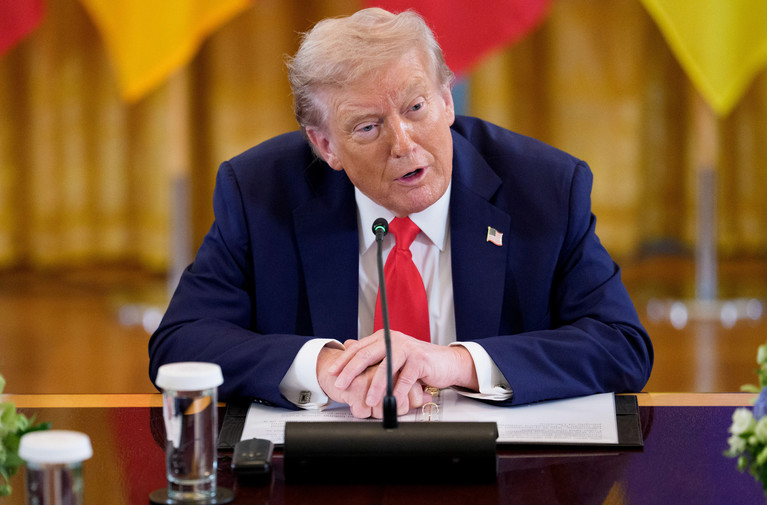Big Law Dives Back In: Firms No Longer Shying Away from Trump Business Amid Pressure and Deals
In a dramatic reversal, elite law firms once wary of associating with Donald Trump’s ventures are now actively engaging with his business empire and administration priorities. After years of avoiding Trump-related work due to reputational risks and conflicts from his legal battles, Big Law giants like Kirkland & Ellis and Latham & Watkins have struck multimillion-dollar deals to provide pro bono services, effectively opening doors to Trump-aligned clients and causes. This shift, accelerating since early 2025, reflects a pragmatic calculus: better to negotiate than face punitive executive actions.
The trend marks a seismic change in the legal landscape, where Trump’s second-term threats have compelled firms to prioritize survival over past ethical qualms.
The Deals: Pro Bono Pledges to Avoid Retaliation
Since February 2025, President Trump has issued a series of executive orders targeting law firms accused of “weaponizing” the legal system against him—often those representing opponents like Hillary Clinton or Dominion Voting Systems. These orders revoked security clearances, barred access to federal buildings, and threatened government contracts, prompting swift capitulation from several titans.
By April 2025, five major firms—Kirkland & Ellis, Latham & Watkins, A&O Shearman, Simpson Thacher & Bartlett, and Cadwalader—agreed to provide $600 million in free legal work to Trump-backed initiatives, such as trade negotiations and veterans’ support. Earlier, Paul Weiss and Skadden Arps pledged $140 million combined, totaling nearly $1 billion in concessions across nine firms.
Trump boasted on Truth Social that these deals included commitments to end “race-based hiring” (DEI practices) and represent “politically disenfranchised groups,” including his allies. In August, Kirkland & Ellis and Skadden were linked to Commerce Department trade work, blurring lines between pro bono and Trump business.
From Avoidance to Embrace: Why the Change?
Pre-2025, many Big Law firms steered clear of Trump entities like the Trump Organization or his hotels due to ethical conflicts and backlash risks. Firms like Perkins Coie (Clinton’s counsel) and Covington & Burling (Mueller probe) faced Trump’s ire for past work, leading to avoidance of his ventures. Trump’s first term saw similar tensions, but his 2025 return amplified them with direct threats.
The pivot stems from self-preservation: Executive orders crippled operations, prompting settlements to restore clearances and contracts. Firms like Jenner & Block sued and won rulings deeming the orders unconstitutional, but many opted for deals to “uphold principles” while gaining favor. Legal experts call it “coerced compliance,” with one NPR source likening it to “deals with a gun to the head.”
Now, these pacts extend to Trump businesses: Cadwalader, home to Trump’s ex-lawyer Todd Blanche, is primed for ongoing work, while Kirkland’s trade assistance could spill into Trump Org deals.
Expert Takes: Coercion or Pragmatism?
Veteran attorneys decry the deals as “terrible developments” that chill representation of adversaries. Steven Brill, founder of The American Lawyer, warned they erode the rule of law, with firms like Paul Weiss losing 10 partners, including Karen Dunn, in protest. Over 800 firms backed amicus briefs against the orders, calling them “undisguised retaliation.”
Defenders frame it as business savvy: “Big Law bends the knee because they know they were wrong,” per White House spokeswoman Karoline Leavitt. On X, reactions split: Conservatives cheer “ending DEI in Big Law,” while progressives slam “extortion,” with #BigLawSurrenders trending. Law schools report students avoiding settling firms, signaling reputational hits.
Impacts on U.S. Businesses, Lawyers, and the Economy
For corporate America, the deals open Trump business to elite counsel, potentially smoothing deals for his hotels, golf courses, and media ventures like Truth Social. But it risks conflicts: Firms pledging to represent “disenfranchised groups” may sideline opponents, chilling challenges to Trump policies.
Economically, the $1 billion in free services—valued at billions in billables—subsidizes Trump’s agenda, from trade pacts to antisemitism initiatives, indirectly benefiting his businesses. Big Law’s $50 billion industry faces talent drain, with boutiques forming to fight Trump (e.g., Abbe Lowell’s new firm). Politically, it emboldens Trump’s “America First” legal war, influencing 2026 elections and DEI debates.
Lifestyle-wise, everyday Americans see uneven justice: Vulnerable clients lose top advocates, while Trump’s circle gains free firepower. Sports ties? Trump’s golf empire may leverage Kirkland for expansions.
Conclusion: A Legal Landscape Reshaped by Compromise
Big Law’s embrace of Trump work—via coerced deals totaling nearly $1 billion—signals the end of its self-imposed avoidance, trading ethics for access amid unprecedented pressure. As courts strike down orders, the fallout lingers: Departures, boycotts, and a divided bar.
Looking ahead, expect more firms to follow suit or litigate, but Trump’s leverage has tilted the scales. For U.S. stakeholders, it’s a cautionary tale of power’s pull on the rule of law.
